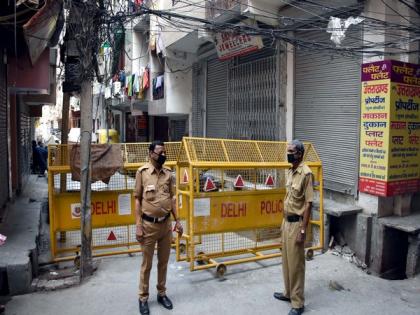People residing in sealed areas in Delhi share their experiences
By ANI | Published: April 12, 2020 07:20 PM2020-04-12T19:20:20+5:302020-04-12T19:30:09+5:30
While the number of "containment zones" put in place in Delhi to contain the spread of the novel coronavirus infection has risen to 43 on Sunday, for people living inside them it is an experience wrought with anxiety.

People residing in sealed areas in Delhi share their experiences
The Delhi government has put in place a strict containment plan for these COVID-19 hotspots with police authorised to physically prevent people from moving out and movement restricted for outsiders, through measures such as barricading and deployment of police personnel.
Home delivery of essential items is allowed so is a visit to the hospital for an emergency. What is not permitted is going about without a government ID, opening of shops, banks, ATMs and attending gatherings which is strictly prohibited till the tag of COVID hotspot is removed from these localities.
Police personnel have been positioned outside the barricaded apartments or alleys to monitor every movement of residents.
People shared their experience of life under sealed zones, of how they attempt to adjust to changed circumstances that have been thrust on them in a bid to contain the spread of the virus.
A resident of Pratap khand, Jhilmil Colony, Shahid Ansari, 38 told over phone: "It's difficult to live in this manner especially when you have a baby. My daughter is just six months old and there are many items which we need to buy for her regularly. As we are not allowed to go out I ring the helpline numbers of our nearest stores to get the essential items delivered outside our apartment with permission from the police.
"Our relatives and neighbours do call us over the phone and keep us updated about each other. Also, people from the Health department regularly call us to inquire about our health. Hope the situation becomes fine soon," Ansari said.
Usha Nandini, a resident from Vardhaman Apartment, Mayur Vihar Phase 1, which has been declared a containment zone said: "I have changed my routine and am adapting toa minimalistic living. I have no other option as I cannot go out to buy stuff and all my family members are in Kerala. For anything urgent I am informing the police personal posted outside the apartment. I have not stepped out from my society nor spoken to people in person for a long time. However given the crisis we all need to help each other by maintaining social distance. I hope this phase passes quickly too like many others."
People inside the sealed zones are mostly not been allowed to come outside their houses/ apartments other than to seek essential help.
Residents of Supertech Capetown township, Sector 72, Noida have initiated a series of distancing and quarantine measures after a 42-year-old man tested positive for COVID-19.
The society has been sealed for the second time after it was identified as hotspot along with 22 other localities in Noida.
30-year-old Jayesh Gandhi, a resident of Supertech Capetown, Sector 74 told over a phone conversation: "We are complying with every guideline issued to us however there are certain problems that need to be sorted. Currently, our fridge is not functioning at all for which I cannot even stock vegetables. I had to go to buy vegetables every day and mostly we are not allowed to go outside our building what can be done in this situation? We need help."
Moreover, in hotspot zones rigorous stization, door to door monitoring is also considered as essential.
On Saturday Delhi CM Arvind Kejriwal tweeted that Prime Minister had taken a correct decision to extend lockdown although no formal announcements have been made yet.
Health minister of Delhi Satyendra Jain informed that everyone living in these hotspots will be screened for COVID-19 symptoms.
India has reached its third week of lockdown that is been observed as a necessary measure to curtail the spread of easily communicable COVI-19.
With country focussing on the increased number of tests cases are likely to surge. To face the situation Delhi government has transformed various of its hospitals for treating COVID-19 patients.
The total number of COVID-19 positive cases in Delhi has crossed 1000 with 19 people succumbing to the illness so far.
( With inputs from ANI )
Open in app